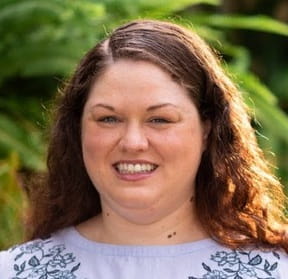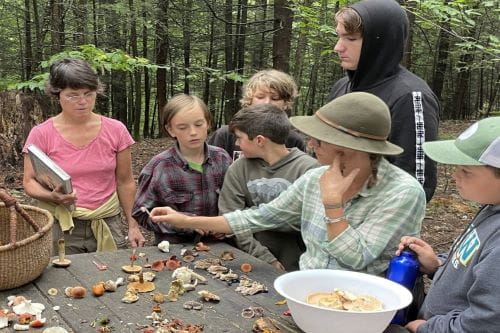Immersion in nature assists the development of the whole child. Spending time in the natural world promotes environmental concern, sensitivity, and activism. Maria Montessori advocated for the importance of a child’s connection with nature, asserting, “The land is where our roots are. The children must be taught to feel and live in harmony with the Earth.” At Hilltop Montessori School (HMS), an AMS-accredited school in Brattleboro, VT, Finn Campman, a middle school teacher, recognized the need to provide students with the opportunity to fall in love with the land and helped to develop a full outdoor curriculum centered around their beautiful outdoor environment, Upland.
Upland is a forested plot of land with several hundred acres, extending fields, and a small pond. Campman and his colleagues utilize Upland as an outdoor Prepared Environment, providing students with access to a natural space for developing a sense of community, fostering a connection to the land and its history, and engaging in scientific exploration. HMS’s middle school students begin each academic year living together in the forest, learning to appreciate one another and the land they share. They work to collect firewood and water, prepare food on an open flame and in a clay oven built by former students, develop woodworking skills, and discover and map the tangible geography of the area. Throughout the course of each year, students internalize a deep appreciation for Upland as they learn about those who thrived on the land before their arrival and imagine plants and animals who made the land their home. In a focused plot study, each student is given a quarter acre of land to map and explore in detail. Walking through the woods with expert foresters, geologists, mycologists, naturalists, pteridologists, anthropologists, and ornithologists, students make fascinating discoveries about the land in which they have become immersed.
One of those experts, forager and former HMS parent, Melany Kahn, leads students on first-hand explorations and investigations of nature through wild mushroom foraging, an activity growing in popularity worldwide. Foraging provides an excellent means to introduce inquiry to students and inspires engagement and curiosity in the natural world. As students gather and then organize mushrooms into species and genera, they discuss their fascinating attributes in great detail. After learning so much about these unique fungi, students then prepare and cook mushroom focaccia in their handmade clay oven. Kahn describes the exciting process of gathering fungi, identifying their characteristics, and enjoying the fruit of their labor as one that has helped students relish in rich sensorial experiences. She states:
I watched their love of the forest and the environment burgeon from idea to actualization. I stood in awe of a curriculum that understood the forest as a Prepared Environment for infinite learning, that encouraged children to gain knowledge in so many aspects of the natural world, that trusted the innate curiosity within each of them, and fostered a love of learning from the student’s interior landscape towards the greater world around them, and ultimately, around all of us.
This love for learning and for the natural world has been an inspiration for many HMS faculty, parents, and community members. In fact, Kahn was so moved by the students’ work in Upland that she wrote a book entitled Mason Goes Mushrooming that was released in October 2022 describing the fascinating process of mushroom foraging. Kahn hopes to introduce more children to the wonderful world of mushrooms and the excitement of the treasure hunt. HMS faculty look forward to sharing the book with their students, hoping to continue igniting their passion for exploring and investigating the natural beauty of Upland as they work towards developing stewards of the planet. Campman explains, “We must provide our students with the opportunity to fall in love with the land, to form attachments, to sense their connection and reliance on the natural forms and processes of the world. Only with these deep connections and strange feelings of love for the land can we hope for a more balanced approach to the world in general.”
It is this love that HMS anticipates will allow students to develop the “spiritual equilibrium” to which Montessori referred, a moral pull to protect the Earth. They hope that the immersive experiences students are provided in Upland will help them become true citizens of the world as they develop an understanding of the need for a sense of balance between human growth and expansion and the conservation of natural resources. Campman reveals, “It is in this full and engrossing immersion that we hope to cultivate the love that will offer balance to humanity’s relationship with the world.”
Reference
Montessori, Maria. The “Erdkinder” and the Functions of the University: The Reform of Education During and After Adolescence. London: Maria Montessori Training Organisation, 1939.
About the Author
 The opinions expressed in Montessori Life are those of the authors and do not necessarily represent the position of AMS. |


